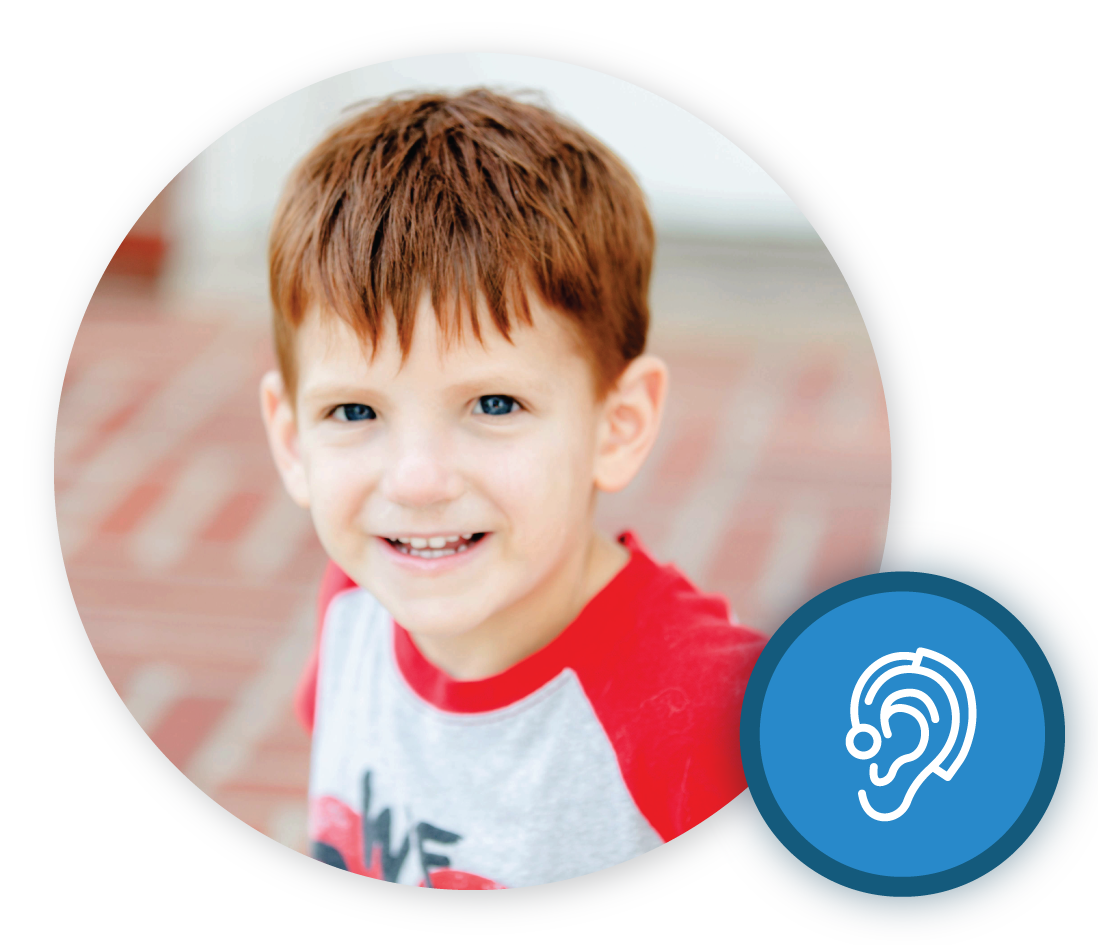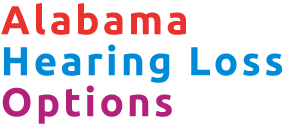Listening And Spoken Language

What is LSL?
LSL teaches infants and young children to listen and talk through natural, play-based activities. Parents help their child learn to listen and speak without the use of sign language. Language is learned through listening. Children with all hearing levels (mild to profound) can use LSL.
Children with hearing differences who use LSL need to use hearing aids, cochlear implants, or other hearing technologies. Hearing technologies allow sound to reach the brain. Parents are coached by a Certified LSL Specialist. Parents play a big role from the start. Parents use what they learn in therapy to create a language and listening rich environment for their child at home. Children who use LSL attend their local school and learn through listening, speaking, reading, and writing.
Answers to Common Questions
What commitments will be needed for my child to be successful if I chose this option?
- You will need to make sure your child is wearing appropriate hearing technology during all hours your child is awake.
- You will need to attend therapy sessions with a Certified LSL Specialist. These sessions teach you ways to help your child learn to listen and speak using activities that are fun and motivating for you and your child. Sessions can be in person or on-line (using telehealth).
- The things you learn in therapy are used at home during play time, mealtimes, and everyday activities.
- Many hearing tests will be needed. These appointments are very important. A clear picture of your child’s hearing is needed. These appointments will continue to be important as your child grows.
- Hearing technology must be kept in working order. There are programs, including Medicaid, that can help pay for hearing technology and upkeep.
What things help children be successful with LSL?
Getting started at a young age helps your child. Early access to sound contributes to success. Lots of kids who use LSL sound just like their parents and siblings, southern accents included!
Most infants and children who have a hearing difference can benefit from hearing aids. Other hearing technologies are available for children who have more severe hearing levels. Hearing technology is always improving. Modern hearing technologies can give children high quality access to sound.
Being consistent pays off. Make sure your child is using their hearing technology all day, every day. Attend therapy regularly. Truly integrate listening and spoken language strategies and techniques into your daily life. You don’t need to be ‘perfect’ every day, but steady focus does make a difference.
What might get in the way of my child being successful with LSL?
Success using LSL depends on consistent listening with well fit hearing technology. Hearing technology needs to be worn at least 10 hours every day for best outcomes. Babies and toddlers may not be awake for 10 hours every day. Working toward meeting the 10-hour goal as your child gets older and is awake longer should be part of your plan. Exceeding the 10-hour goal has been shown to be helpful, too. The more ‘time in sound’ the better!
Once you have decided to use LSL, your ENT (Ear, Nose, and Throat doctor) should request a CT scan of your child’s inner ear. The CT scan will examine the inner ear and hearing nerve structures. Differences in the inner ear or hearing nerve can make it difficult for a child to benefit from hearing technology. This is rare. Listening skills will not develop if sound can’t reach the auditory centers of the brain. Learning spoken language is difficult without listening skills.
Many things can affect outcomes. Your LSL therapist can help you check your child’s progress and determine if any changes need to be made.
What are the benefits of this communication approach?
The biggest benefit is that your child can learn to listen and talk just like other children. Children who use LSL speak the same language used by their family and their community. Many children who start early never experience delays. Others who start early catch up to their peers by the time they are preschoolers.
Children who use LSL learn language the way other children learn language. Language is learned by listening and talking with family, neighbors, teachers, and friends. LSL follows a normal language development model for learning.
What are the expected outcomes with this approach? What will my child need 3 years from now? Ten years from now? As a young adult?
Children who use LSL attend their neighborhood schools just like their siblings and friends. They grow up in a hearing world just like their family members. Your LSL Specialist and an educational audiologist can help school staff understand your child’s unique listening and learning needs.
Some children will require support from a LSL Specialist or a Speech Language Pathologist through their early school years. Some do not. Once language skills are caught up, no special language instruction is needed. Children who use LSL do not use sign language interpreters. All children who use LSL will need to have regular check-ups with their audiologist throughout their life.
Who can help me learn more about LSL?
There are Certified LSL Specialists throughout Alabama. LSL Specialists can answer your questions and help you get the information you need to make the best decision for your child and your family.
There are parent support groups. Some groups are local. Some groups are national. It is often helpful to connect with a parent who has been there and done that. They understand your situation in a way that only another parent can.
My child is under 6 months old. Aren’t we too young for speech therapy?
It is never too early to begin learning strategies for making listening and talking a part of your daily routine. Lots of learning before happens before children use their first words.
It is also important to learn about hearing testing and hearing technologies. Hearing aids, cochlear implants, or other hearing technologies should be fit quickly. Babies are never too young to be fit with hearing aids. Best practice is to fit hearing aids within 1 month of diagnosis. Children who are cochlear implant candidates can have surgery as young as 9 months of age.
Starting as early as possible supports best outcomes. Don’t wait!
What is LSL therapy like?
LSL therapy sessions normally take place once a week. Sessions can be at a clinic, in your home, or online. You or another caregiver should plan to participate in all therapy sessions.
You and your child will have goals for learning to listen and speak. You will learn how to work on these goals in your home throughout each week. Learning to listen and encourage language development should become a part of your everyday routines at home. The main job of your Certified LSL Specialist is to guide and coach you to become your child’s primary teacher and advocate. Therapy sessions are fun! Most parents and children look forward to therapy each week.
Your LSL Specialist and pediatric audiologist will work together to monitor your child’s progress. Monitoring progress helps make sure your child is on track for success. If things are not on track, these professionals can help you find out what might be holding your child back. They can also help get things back on course.
What is so special about Certified Listening and Spoken Language Specialists?
A Certified LSL Specialist is truly the most qualified person to help your child achieve their listening and spoken language goals. A Certified LSL Specialists can be a speech pathologist, an audiologist, or a teacher of the deaf/hard of hearing. All Certified LSL Specialists have special training that goes beyond their college degree. Certified LSL Specialists must complete 80 hours of extra educational coursework. They must be guided by a mentor for 1 to 3 years and complete more than 900 hours of clinical practice. Last, they must pass a national certification exam.
There are only 1,000 Certified LSL Specialists in the world. Alabama is fortunate to have 12 Certified LSL Specialists! Sometimes, Certified LSL Specialists are also called Auditory – Verbal Therapists or Auditory – Verbal Educators. Be sure to ask your provider if they are a Certified LSL Specialist.
My family doesn’t live near a center that provides LSL therapy. Does that mean we can’t choose spoken language for our child?
Telehealth has helped make LSL therapy more readily available. A LSL Specialist can provide sessions to you and your child online using telehealth. If you prefer to have sessions in person, that is ok too. Many families travel to receive LSL therapy.
Traveling with a small child can be a big task. With support from family and friends, many parents found that they could make anything possible! They found the effort and hard work in the beginning worth it in the long run. Your LSL Specialist can help you work out the best set-up for you and your child.
I think that LSL will be the best option for our child and our family. What do I do now?
Find a Certified LSL Specialist, enroll in therapy and start your journey!
Talk to other families with children who are deaf or hard of hearing and use LSL. Connect with adults who are deaf or hard of hearing and use LSL. Ask about their experiences using LSL.
Children who use LSL must have well fit hearing technology. Find a pediatric audiologist who specializes in fitting children with hearing aids, cochlear implants, and/or other hearing technology so that you can get the best sound to your child as soon as possible.
Laugh, snuggle, giggle, play, and enjoy your child. Act Early! Be Involved!
